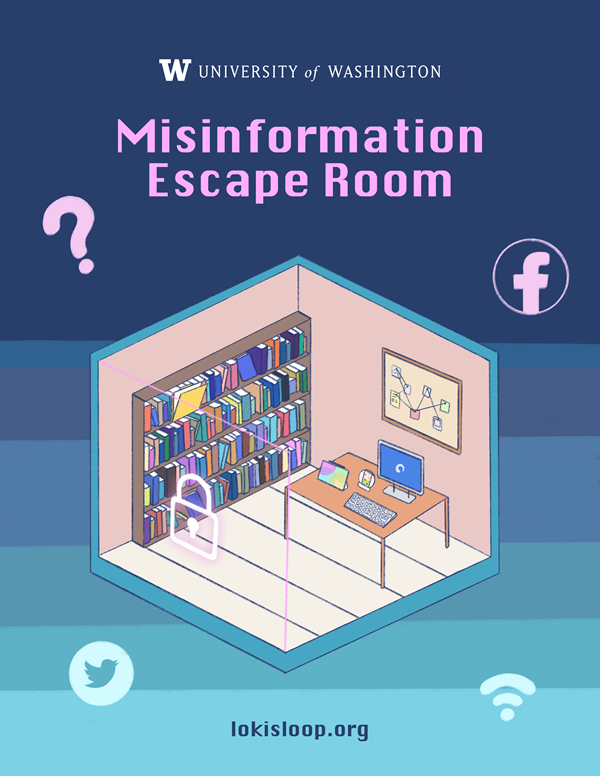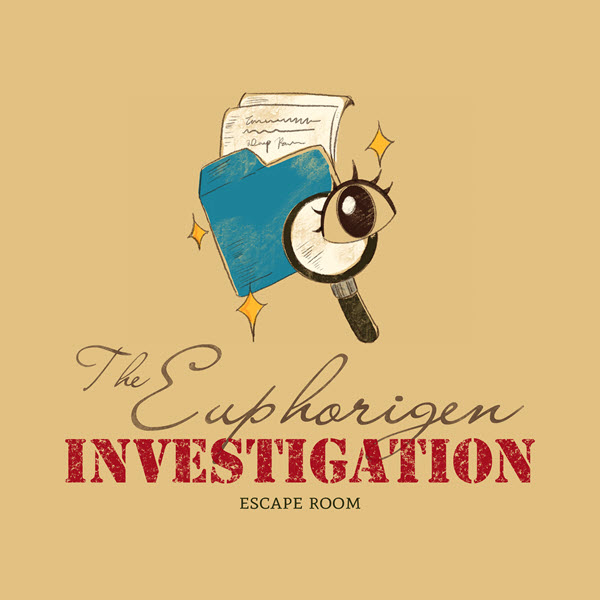Host a new virtual misinformation escape room at your library
 Is your public library looking for a fun way to teach community members about spotting misinformation in social media? Do you know people in your community who like to solve puzzles, play live-action adventure games, or who are craving some structured social activity? If so, your library can apply to be one of ten across the U.S. to host and evaluate an online escape room game, The Euphorigen Investigation. As part of a project led by the University of Washington Information School (UW iSchool), this game was developed in response to library staff who asked for ways to help patrons navigate misinformation beyond traditional information literacy programs. Euphorigen builds upon the success of other online games about misinformation, and has been designed for and tested by public libraries.
Is your public library looking for a fun way to teach community members about spotting misinformation in social media? Do you know people in your community who like to solve puzzles, play live-action adventure games, or who are craving some structured social activity? If so, your library can apply to be one of ten across the U.S. to host and evaluate an online escape room game, The Euphorigen Investigation. As part of a project led by the University of Washington Information School (UW iSchool), this game was developed in response to library staff who asked for ways to help patrons navigate misinformation beyond traditional information literacy programs. Euphorigen builds upon the success of other online games about misinformation, and has been designed for and tested by public libraries.
How does a library host a virtual escape room?
Escape rooms are live-action adventure games where teams of players work cooperatively to solve a series of interactive puzzles. Euphorigen is a virtual escape room that is hosted on Zoom, where players interact with the escape room website. Euphorigen was designed to be hosted by a library staff member for teams of teens (14+) and/or adults, with 4-6 players per team. During live gameplay, the library staff member hosts the teams in Zoom, points them to the website, and offers hints to players as needed. Players interact with each other as they try to solve the puzzles within a set time period. The puzzles in Euphorigen focus on common forms of misinformation people find on social media, such as misleading charts, deep fakes, and social media bots. The session ends with the players participating in a 15-minute debrief discussion with the library staff member. Each escape room session lasts approximately 1.25 hours, including post-game discussion.
What do people think of the Euphorigen escape room?
 It pointed out to me how my bias might affect how I receive certain kinds of information. I didn't realize the level of sophistication and trickery that goes into spreading misinformation - my tendency is to think that people who are susceptible to misinformation are either not very intelligent or educated, but I think that feeling comes from people believing in some of the more outlandish ideas out there.
It pointed out to me how my bias might affect how I receive certain kinds of information. I didn't realize the level of sophistication and trickery that goes into spreading misinformation - my tendency is to think that people who are susceptible to misinformation are either not very intelligent or educated, but I think that feeling comes from people believing in some of the more outlandish ideas out there.
I was aware of misinformation, especially misinformation from bot accounts and misleading representations of data. This exercise helped give me more knowledge to combat this misinformation, allowing me to identify it and thus become less susceptible to it.
The UW iSchool used the feedback from participants and library staff to make adjustments to the game. Now, the project team is seeking more public libraries to host the game in their communities so it can finalize the game and learn more about how games might improve information literacy.
How to apply to be a Euphorigen escape room library host
As part of an IMLS-funded grant project, UW iSchool has partnered with WebJunction to recruit 10 U.S. public libraries to host the Euphorigen game. Participation includes running 6 sessions of the escape room with players from their community, participating in a focus group, and supporting the research data collection processes. These activities will help UW iSchool assess the escape room’s impact on misinformation learning goals and guide final improvements to the game before it is released for any library to use.
The ten public libraries will be selected based on capacity and commitment to host the Euphorigen virtual escape room during January - March 2022, and to participate in data collection procedures. The project team seeks a group of libraries that represent a variety of library sizes, geographies, and communities. See below for more details and how to apply.
- Orientation and training for 1-2 library staff
- Promoting the game and recruiting community members to play
- Running 6 sessions of Euphorigen for teams of 4-6 players (approximately 1.25 hours per session, including 15-minute post-game debrief discussion)
- Ensuring participants complete research consent form
Participating in research data collection procedures, which may include pre/post participant surveys, recording game sessions, librarian post-session report, a focus group discussion with participating libraries, and other data collection methods. Personally identifiable information about library patrons and library staff will be kept confidential.
Timeline
- Library recruitment process: through December 2021
- Library training: January 2022
- Each library host 6 online escape room sessions: January - March 2022
Total time commitment: Approximately 15 hours of staff time over 2 to 3 months.
Libraries will receive $500 compensation for participating in the project.
Questions? Send the UW iSchool project team an email at [email protected].
This project has received funding from the Institute of Museum and Library Services (IMLS) LG-250050-OLS-21.
